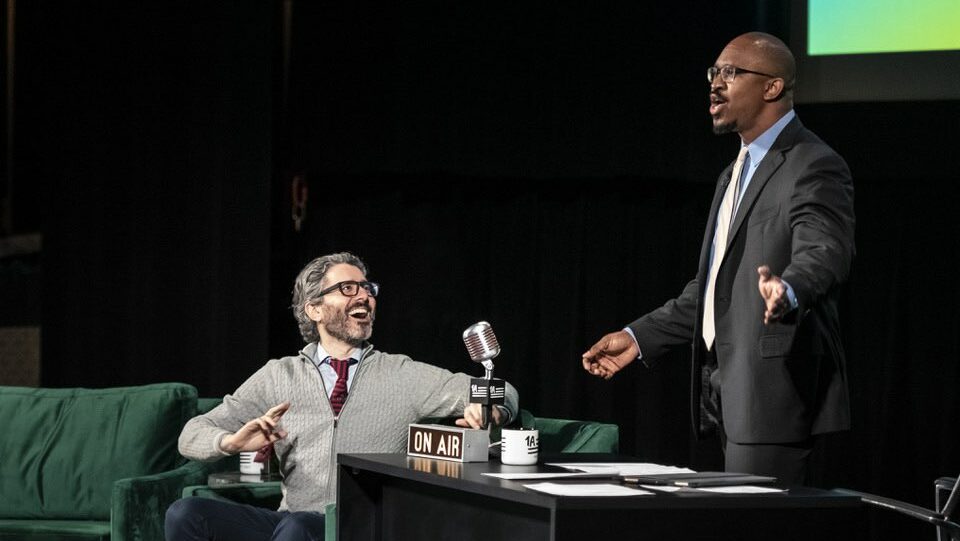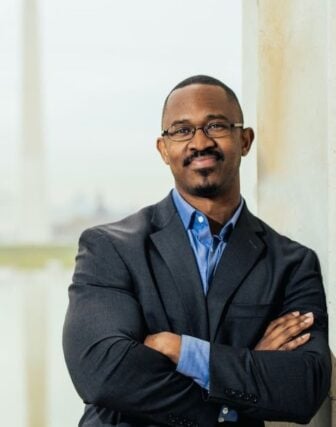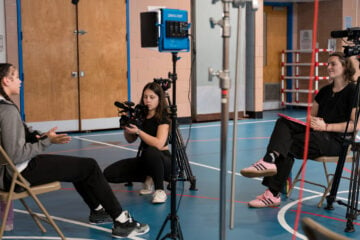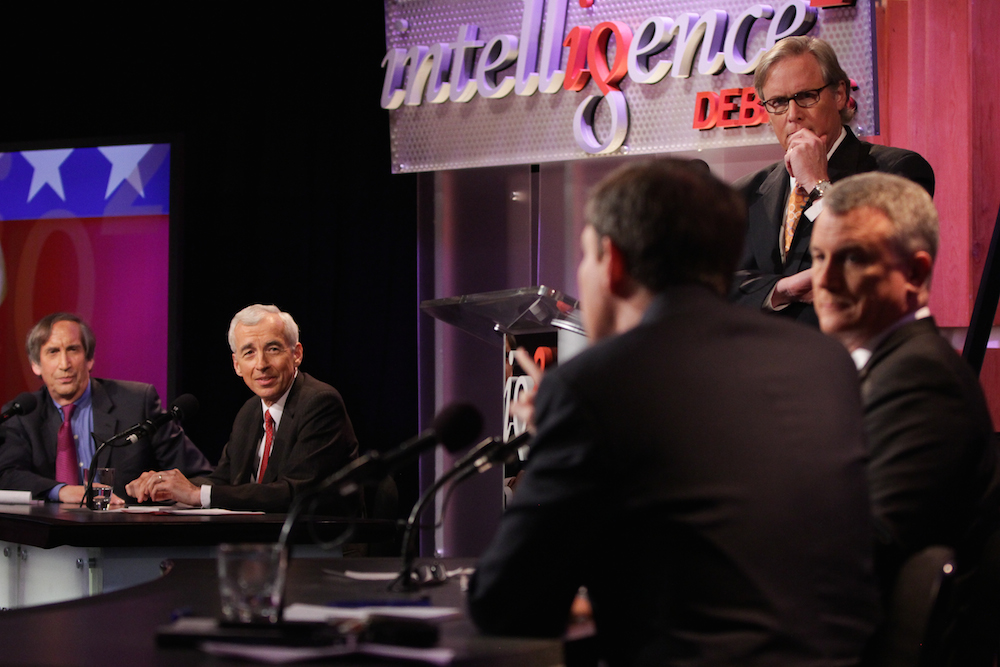To bring audiences back, make shows that people will go crazy for

WAMU
Michael Barbaro of "The Daily," left, on stage with Joshua Johnson during a "1A" event at the Lincoln Theatre in Washington, D.C., in 2018.
I still can’t believe we got away with it.
No one would’ve blamed WAMU for taking the obvious path when preparing for the retirement of talk show legend Diane Rehm. It was a bittersweet transition that capped a staggering 37-year tenure. The succession plan could have gone for someone demographically and stylistically similar, to avoid upsetting her loyal audience of NPR listeners. Instead, they chose me: a tall Black man who was not yet 37 years old. A little-known guy overflowing with zeal about public media’s potential.
And it worked. I’m remiss in not explaining my part in it before now, especially since public media needs a lot more shows like the one I helped create.
In late 2016 WAMU in Washington, D.C., hired me to host the successor to The Diane Rehm Show. My first concern was that they might name it The Joshua Johnson Show. UGH. Is that the best we could do? Make the next thing a drag-and-drop version of the last thing? Thankfully, the station brainstormed lots of titles and concepts. When I arrived, they were calling it “Project X.”
At the time, Donald Trump had just won the 2016 presidential election. Everyone was amped up, bracing for four intense years. Civility seemed obsolete and the public discourse was getting harsher. How would we navigate those winds of change without getting blown off-course … or capsizing?
To me, the answer was simple. Steer into them, full speed ahead.
So America thought it was doomed to polarization? Fine. We’d create a space that leaned into taboos and controversies without flinching. Afraid to be civil? We’d take it a step further — not just tolerating different viewpoints, but welcoming them. Unsure if the old “voice from nowhere” would suffice? We’d be the voice from everywhere, using public radio’s ubiquity and empathy to reflect America back to itself.
Feeling angry all the time? We’d encourage fun and frivolity with segments that dared you not to laugh. Seeking intellectual edification? We replaced the book club segments with a Movie Club, having deeper pop culture conversations than most shows. As for the program’s name, we’d use it to telegraph our values, choosing a title derived both from the First Amendment’s guarantee of free speech and a newspaper industry term for the front page. A name that showed our fans what we believed in.
That is why I named it “1A.” To this day, I can’t believe I got away with it.
Then again, WAMU let me help design every aspect of that show, from the script structure to the theme music. Executive Producer Rupert Allman had secured samples from composer Will Eastman. They were great, but their ethereal electronic feel didn’t sound like me. Eastman, to his immense credit, took my suggestions for a stronger beat: something you could crank up in your car and feel the bass. I loved it when people who listened to the show said, “Wait: that’s from NPR???” They were dumbfounded that this venerable old network could be that playful and edgy while maintaining its smarts. And yet, there it was.
Hearing that theme today can make my eyes well up. I’m so proud of its intricacy: the airy eight-bar intro, the strong four-bar theme, the 20-bar interlude that starts right on the 1 when I’d say, “Hey there: I’m Joshua Johnson. Today on 1A …” The tension builds as the billboard sets up the topic, returning to the theme as we invite the audience to interact with us. The intentional clockwork of it all, right down to the ending with the three final notes that hit just as I’d say, “… or tweet us, ‘at’ 1A.” It was bouncy and big, sharp as a razor and yet comfortable as old leather.
And by the time I left the show in 2019, I felt like a piece of old leather. The reason? My unhealthy approach to creative work.
This kind of production can be stressful and grueling. We laughed a lot, but I know I made my colleagues crazy sometimes. Now I can attribute that to my fear of failure, masquerading as rigorous standards. Public media can seem so sacred that mistakes feel like misdemeanors. The stakes on 1A always felt sky-high, especially as the show became a hit. My perfectionism caused countless sleepless nights and, mercifully, only one trip to the emergency room.
Building 1A showed me that exploration is better than perfection: an opportunity for growth rather than a threat of judgment. The perfectionists on your team are probably terrified to fumble because they believe no one will block tackles for them, and the fans will blame them if you disappoint. Overcoming that fear requires a lot of support and a ton of grace, but it frees us to be even more creative and courageous.
Perhaps that’s also why legacy media are struggling with audience declines. The fear of stumbling can stop us from making strides. Even if we succeed, our exhaustion limits us to taking smaller steps. Even if we go in a circle, at least it feels safe. But comfortable legacies aren’t protecting other media organizations from disruption. Why should they save us, either?
1A built a large audience and affected the civic discourse because that is what we purposefully designed it to do. It became a show that people raved about because we built in things worth raving about. It changed the way people talked about taboo issues because we designed it to do so. 1A felt different from everything on the radio because we built it differently, with a love for the medium and its potential. Broadcasting is like a relay race, and our team ran like people who love to run, not entitled champions.
The real problem might not be that people aren’t listening to NPR or watching PBS as much. It could be that we’re not building shows with the intention that people will be crazy about them.
We’re great at being intelligent. We could do better at being captivating and electrifying. That would gain us more than viewers and listeners: we’d gain fans. Those fans will rave about your work, creating new fans, and some will dig deep to show their financial support.
And, please, spare me the excuses about today’s media landscape being fractured and filled with AI bots. Deal with it. This is the bad hand we’re dealt, and we have to play it. At this point, why should we strive to create anything that’s not amazingly great?
The simple-but-not-easy path is what public media needs today: a creative, courageous push for startlingly great programming. Prove to the public that they were right all along to support you. Give them something to crow about. Make them uncomfortably proud. Your next show could make 1A sound like an Edison phonograph.
Ask yourself: What could your team create that would put 1A to shame? How could you blow us away? Let that question nag you for a while. Give yourself permission. You deserve to come to work every day, make something outstanding and go home knowing the impact of what you made. Not just hoping, but tangibly knowing that you made a dent. Because as grueling as 1A was, I know in my heart we did not waste one single day.

Now’s the time to make the public say, “Holy sh-t, I didn’t know they could do that!” And then, savor the only thing better than getting away with it: the knowledge that they ain’t seen nothing yet.
Joshua Johnson was the founding host of WAMU’s national talk show 1A, distributed by NPR. Following 1A he served nearly three years as an anchor for MSNBC & NBC News, launching the primetime newscast NOW Tonight with Joshua Johnson. Today he is creator and host of The Night Light, a multimedia project about democracy & cultural connection.






